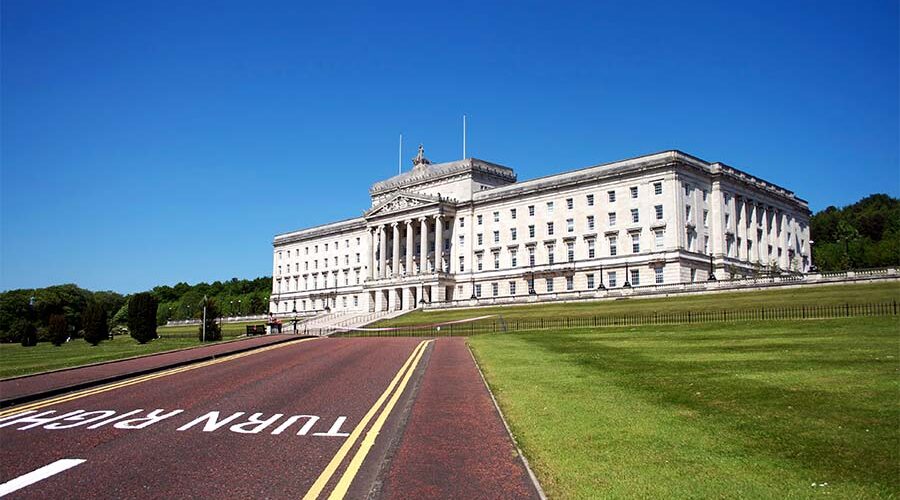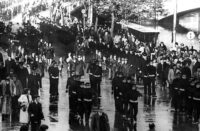After almost two years without a devolved administration, the northern state appears politically deadlocked. The latest round of talks in Hillsborough castle between the British government’s Chris Heaton-Harris and the five largest parties in Stormont have concluded without a definite restoration of the institutions. This in spite of the fact that four of the five parties involved were willing to accept the Treasury’s offer/bribe of £3.3 billion. An offer contingent, though, on the restoration of the Assembly and ominously described as final by the Secretary of State.
On the surface, the stumbling block appears to be the DUP’s refusal to budge on the issue of the Windsor framework. In reality, the problem goes deeper than one party’s obstinacy. At its heart lies the contradiction inherent within Northern Irish unionism. For that constituency the issue is how to make Northern Ireland function successfully without making any concession to those seeking an alternative constitutional arrangement.
Nobody epitomises this dilemma better than DUP leader Jeffrey Donaldson. During his address to the party’s recent annual convention he made clear the problems created by a non-functioning Assembly. He stated that such a situation risked having Northern Ireland deemed a failed and ungovernable state and urged party members to; ‘… to face up to new realities and adapting to new circumstances…’.
Lending weight to his analysis was support from former party leader Peter Robinson. A close acolyte of party founder, Ian Paisley, Robinson was never a weak-kneed liberal, as evidenced by his storming of Clontibret, Co Monaghan. Prior to the recent talks, he publicly advocated accepting what was on offer, return to Stormont and thereafter negotiate further change.
Notwithstanding this powerful intervention, plus silence from his party executive, Donaldson felt unable to abandon the rejectionist line. A stance he maintained after the roundtable talks that included the significant financial inducement mentioned above.
Meanwhile, rejecting the Treasury offer is causing the DUP ongoing local difficulties. There has been persistent complaints from many quarters about failings in the local health service centred on lengthy waiting lists, a problem not helped by the absence of a Stormont based health minister. More recently three large public sector unions have been forced to take strike action in order to secure restoration of pay, lost to inflation.
The fact that both these issues were addressed through the Treasury offer of additional funding, subject to Stormont reconvening, discomforted the DUP and its leader. Several striking trade unionists were unambiguous when interviewed on TV. They blamed the politicians for preventing a pay raise that was clearly available. Under pressure, Donaldson sought a meeting with senior trade unionists and in an effort to curtail popular discontent desperately called upon Heaton-Harris to increase public sector pay.
So why did the DUP leader not simply ‘go with the flow’, bow to reality, accept the payoff and lead his party back into Stormont? The answer is twofold. In the first instance, there was the opposition from powerful Unionist figures and institutions. Second is the aforementioned contradiction within unionist policy making.
Leading the fundamentalist challenge was the TUV’s bitter but articulate front-man Jim Allister. Deploying the old Paisleyite stratagem of labelling Unionist opponents as unreliable Lundys, Allister sarcastically described the talks as beginning ‘to smell a lot like sell out’ and followed up by postering this message across the six counties. Immediately after the talks ended, the TUV leader came out demanding total revocation of the Windsor Framework.
While Jim Allister may still be deemed more of an irritant than a major electoral threat to the DUP, opposition to compromise emanating from another quarter has to be taken much more seriously by Donaldson and his advisers. One day before the Hillsborough talks ended, the Grand Orange Lodge of Ireland (the Orange Order’s governing body) issued a communique to all its lodges[1]. The message emphasised that it supported continuing the Stormont boycott until UK and EU ‘fully address matters of trade within the UK and the imposition of EU laws in Northern Ireland’. Equally ominous, the circular continued; ‘…Grand Lodge is committed to examine how best our structures will be used to encourage voter registration and turnout ahead of a general election.’
When taken in conjunction with the knowledge that some senior members of the DUP share this absolutist position, the future for the Stormont Assembly is at best uncertain. Should Donaldson agree to return while the framework remains in place (in reality it’s going to stay), he will face strenuous and probably irresistible opposition. Should he continue to stay out, the outcome for hardline Unionism may be worse still.
Out of office, absolutist unionism will find it has diminishing influence with and loss of purchase over the levers of power. Much if not all, will then depend on how other key players analyse and respond to the situation in both the short and long term.
What if Britain’s ruling class decides its self interest is better served by maintaining a healthy working relationship with the financially powerful EU rather than by placating the eccentric demands of what is fast becoming a minority in the north of Ireland.
What if the British are serious about negotiations being finished and opt to move forward on demands being made by, among others, the Alliance Party and Tánaiste Micheál Martin, that no single party have the ability to bring down the Assembly and Executive. A proposal that could lead to replacing D’Hondt selection with that of a qualified majority mechanism wherein hardline unionism could well find itself powerless and in opposition.
What also if the Dublin government’s referral of Britain’s Legacy Act to the European Court of Human Rights is a subtle stratagem designed to pressurise the UK government into taking steps to break the northern impasse. While a settlement along the lines mooted above might allow the six county state a temporary stay of abolition, it would be at best short-term and all the while damaging for unionism.
The largest unionist party is therefore faced with a difficult choice. It must either re-enter Stormont while the framework remains intact and endure the likelihood of a hard-line rebellion inflicting damage not only on party but on the political entity it purports to uphold. The alternative is to abstain and risk having a non-unionist executive imposed by a Tory government.
Almost 60 years have passed since the then Prime Minister of the six counties, Terence O’Neill, warned that Ulster stood at the crossroads. Something similar may well be said of Ulster unionism today but with one significant difference: now it has fewer options, if any.
[1] Framework still has to be changed. Order. Newsletter 20/12/23






